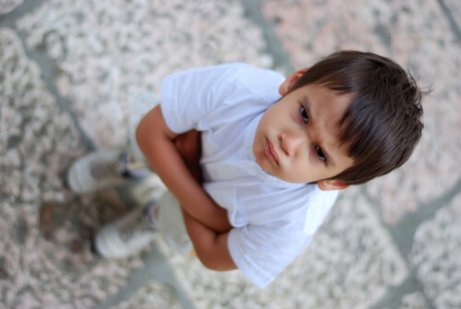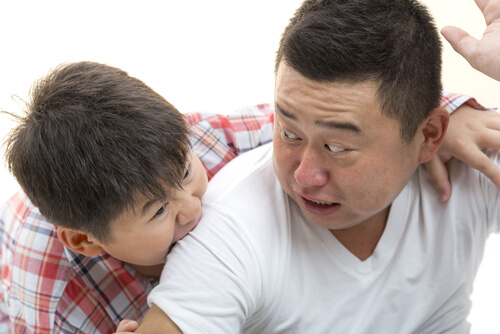What Should I Do if My Child Bites His Classmates?

Are you worried because your child bites? It might be hard to believe, but kids in general are prone to biting others. This may mean their classmates, siblings, parents or other adults.
For some children, this bad habit lasts longer than with others. But the reality is that at some point or another, all children bite.
That being said, just because biting is normal doesn’t mean that we as parents should let it slide. If a child bites, correcting and avoiding this behavior is very important.
Specialists claim that biting is part of a child‘s development and self-discovery. It’s also a sort of “advanced” defense mechanism. In other words, what the child cannot explain with words, he expresses through bites .
Normally, children bite out of frustration rather than aggression. In most cases, children have no intention of hurting the other person.
However, they may wish for the person to move away, or may be trying to express some annoyance. Infancy isn’t just a complicated time for parents. It’s hard for kids, too.
So, what should I do if my child bites his classmates or friends? How should I address the parents? Should I punish my child or demand that he says he’s sorry?

Remember that children have a hard time understanding and interpreting the attitudes of adults. Many actions of a normative, moralist or diplomatic nature don’t fit into a child’s reasoning.
For example, being polite, dialogue, and problem solving are things that take time to learn. Therefore, the way in which you correct your child can’t be too “adult like.” If it is, your child won’t be able to understand.
Discover the source of the behavior
Biting can stem from a variety of motives. On occasion, it may simply be a learned behavior – something your child saw another child do.
However, biting is mainly an attempt at communication. But even when we understand what’s going on, we must realize that this is a behavior that has to stop. And eliminating the behavior can be a challenge.
Parents and teachers are the main people responsible for correcting and preventing this type of conduct. It’s very common for parents to complain to the school when there is biting by another classmate.
Also, children may only bite at school, and not at home. Therefore, sometimes teachers are the first line of defense when it comes to children that bite.
If your child’s teacher calls to tell you that your little one has been biting others, you may be embarrassed and troubled.
It’s normal to want to deny or justify your child’s behavior. However, what you need to do is correct your child. Talk with your child and try to discover the cause behind the biting.
Your child may very well feel ashamed, too. And how do children demonstrate shame? They may break down crying, have a tantrum, or try to hurt you physically. As a result, correction can become even more difficult.
Why does my child bite?
As we’ve said, the reasons vary greatly. Some of the main causes are the following:
- Children may bite because they’re trying to express their emotions. Something is making them uncomfortable, or there’s something going on that they don’t like. Or perhaps they want something desperately.
- They’re unfamiliar with their surroundings and the people around them.
- Children also bite to defend themselves from the aggression of other children.
- If the biter is a baby, then it may have to do with teething discomfort.
- As children gain independence, they also become frustrated by their limitations. This frustration can lead to biting.
My child bites, so what do I do?
If your child has already had several episodes of biting others, then you might already have an idea of the reason. So now, remember that you can prevent this behavior from occurring in the future through good communication.
Also remember that children may bite without being aware of the consequences. But they might also not care. Whatever the case may be, you need to intervene and keep it from happening again until your child changes her behavior.

The following actions can be helpful in changing the behavior of a child that bites:
- Speak to your child – explain that this behavior is not acceptable. Remember to keep your child’s age and maturity level in mind when choosing your words. Share your feelings and the feelings of the injured child. Tell your child that there will be consequences for this conduct.
- Avoid yelling at and mistreating your child, but show your authority. The correction should be immediate. You may choose to take away something that your child likes. For example, you can limit play time or screen time.
- Observe your child’s behavior. You’ll likely detect signs that your child is uncomfortable or is experiencing feelings that bring her to bite. If you can deal with this discomfort or negative feelings, then you’ll likely prevent the biting altogether.
- Ensure that your child avoids revenge in every sense. Sometimes children bite because someone bit them first, or to defend themselves from aggression. It goes without saying that you should try to protect your child from injury. But also, teach your child to protect himself in a better way.
- Maintain effective communication with teachers and caregivers. This will allow you to extend precaution and share disciplinary actions.
Keeping your child from biting others doesn’t have to be complicated. When children realize that something is wrong, they start to modify and change their bad behaviors.
Sometimes, all it takes is to explain the damage they are causing. But even when that’s not enough, make sure that you correct your child lovingly. This will help your child feel loved and understood, and avoid further negative feelings.
All cited sources were thoroughly reviewed by our team to ensure their quality, reliability, currency, and validity. The bibliography of this article was considered reliable and of academic or scientific accuracy.
- Maza, B. (2016). Donde nace la palabra. Revista de la Asociación Peruana de Psicoterapia Psicoanalítica de Niños y Adolescentes, 43. https://apppna.org/wp-content/uploads/2016/11/Transiciones-20-digital-actualizada.pdf#page=43
- Tremblay, R. E. (2003). Los orígenes de la violencia de los jóvenes. http://e-spacio.uned.es/fez/view/bibliuned:AccionPsicologica2003-numero1-0006
- Peñafiel-Balmaseda, J. (2013). Mordedores en pañales. Análisis de las causas y propuesta educativa (Bachelor’s thesis). https://reunir.unir.net/handle/123456789/1621